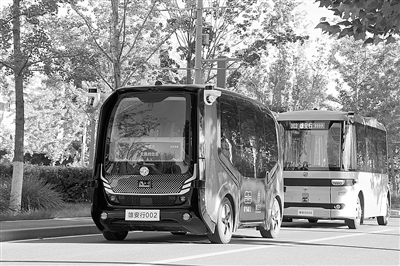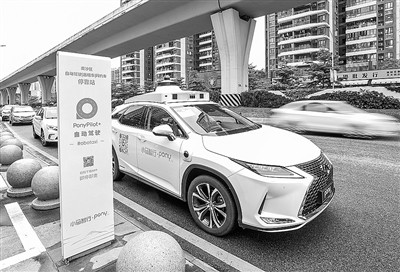
"Yuexiang Xiong ‘an" self-driving vehicle was tested in xiong’an new area. Xinhua News Agency reporter Xing Guangli photo

A self-driving taxi operated by Xiaoma Zhixing is waiting for passengers at a self-driving stop in Nansha, Guangzhou. Xinhua News Agency reporter Liu Dawei photo
The development of China’s intelligent networked automobile industry has entered the "fast lane". In the first half of this year, the number of passenger cars with combined driving assistance in China reached 2.28 million, and the penetration rate rose to 32.4%, a year-on-year increase of 46.2%.
The reporter noted that many places and departments are intensively deploying a new round of measures, clarifying the next development goal, and promoting the industrialization process of intelligent networked vehicles around encouraging technological innovation, optimizing policy supply, accelerating the construction of vehicle-road collaborative infrastructure, and creating autonomous driving and vehicle networking demonstration zones.
Accelerate the industrialization process of intelligent networked vehicles
Recently, many parties have intensively introduced support measures to seize the development opportunities of intelligent, networked and electrified vehicles and accelerate the layout of intelligent networked vehicles.
The Ministry of Industry and Information Technology recently said that it will adhere to the development strategy of "bicycle intelligence+network connection empowerment", further improve measures, and continue to promote the high-quality development of intelligent networked vehicles in China.
The Ministry of Industry and Information Technology proposed that it would unite relevant departments to guide more places to try first, further expand the scope of test roads, select typical areas with conditions under the premise of ensuring compliance, safety and reliability, explore the application of intelligent networked vehicles in all regions and multi-scenarios, and accelerate the industrialization process of intelligent networked vehicles. At the same time, accelerate the construction of intelligent transportation infrastructure, deploy key projects of vehicle networking, promote the construction of national-level vehicle networking pilot areas, and organize pilot projects for the coordinated development of smart city infrastructure and intelligent networked vehicles.
Many places have also set development goals, and put forward detailed measures around enhancing the ability of independent technological innovation, promoting the coordinated development of industries, expanding the comprehensive application of multiple scenarios, and optimizing the supporting environment for industrial development.
Chongqing Action Plan for Innovative Application of Autopilot and Internet of Vehicles (2022— In 2025), it is proposed that by 2025, conditional self-driving cars will be mass-produced and applied on a large scale, and an intelligent networking technology system will be formed to meet the requirements of highly automatic driving. The local support capacity in key technical fields will exceed 80%, and it will be the first in China to build a C-V2X network (cellular car networking) that adapts to the products of more car companies and communication equipment companies.
Shanghai proposes to speed up the development of intelligent networked automobile terminals, strive to build more than three brands with Shanghai logo by 2025, and create more than 10 explosive products, with an output value of 500 billion yuan. Autopilot (L3) cars account for over 70% of new car production, and advanced autopilot technology (L4) can be applied in logistics, transportation, sanitation and passenger transportation.
"China’s intelligent networked automobile industry is developing rapidly and is currently at a critical stage of rapid technological evolution and accelerated industrial layout." Zhao Gang, president of Saizhi Industry Research Institute, told the Economic Information Daily that speeding up the industrialization process of intelligent networked automobiles in many ways will not only help to accelerate the innovation, development, transformation and upgrading of the automobile industry, but also drive profound changes in the fields of intelligent transportation, smart energy and smart cities, and accelerate the innovative development and application of new generation digital technology products such as automotive electronics, artificial intelligence and 5G.
Carry out commercial trial operation of autonomous driving in many places
It is worth mentioning that since the beginning of this year, several cities have carried out commercial trial operations in specific areas of self-driving cars.
Chongqing and Wuhan issued a pilot policy of unmanned commercialization of self-driving vehicles, allowing self-driving vehicles without security officers to carry out commercial services. Beijing officially opened the commercial pilot of unmanned travel service, carried out normalized charging service, and allowed security officers to move from the main driver to the co-driver.
At present, many cities in China, such as Beijing, Chongqing, Wuhan, Shenzhen, Guangzhou and Changsha, have allowed self-driving cars to conduct commercial trial operation in specific areas and at specific time periods.
According to the data from the 2022 World Intelligent Networked Automobile Congress, more than 7,000 kilometers of test roads have been opened nationwide, and the actual road test mileage has exceeded 15 million kilometers. Multi-scene demonstration applications such as self-driving taxis, unmanned buses, autonomous parking service, trunk logistics and unmanned distribution have been carried out in an orderly manner.
Relevant measures will further promote the progress and commercialization of autonomous driving technology. The Transport Safety Service Guide for Self-driving Cars (Trial) (draft for comment) issued by the Ministry of Transport proposes that under the premise of ensuring transport safety, self-driving cars should be encouraged to engage in urban bus (electric) passenger transport business activities in closed bus rapid transit systems and other scenes, and self-driving cars should be used to engage in taxi passenger transport business activities in scenes with simple traffic conditions and relatively controllable conditions.
Locally, the "Several Measures of Shenzhen Municipality on Promoting the High-quality Development of Intelligent Networked Automobile Industry (Draft for Comment)" proposes to encourage commercial operation activities such as manned, loaded and special operations of intelligent networked automobiles. Chongqing proposed to speed up the selection of a number of self-driving open test demonstration roads, and take the lead in carrying out expressway self-driving road test and self-driving commercial demonstration operation.
In addition, the specification for driverless driving is also strengthening. The Regulations of Shenzhen Special Economic Zone on the Management of Intelligent Networked Vehicles make specific provisions on the demonstration application, access registration, driving on the road, network security, accident handling, legal liability and other matters of intelligent networked vehicles.
Zhao Gang said that speeding up the pilot application of autonomous driving, laying out and promoting pilot projects in the fields of road passenger and cargo transportation, urban travel and logistics, transportation in the park, and specific scene operations will play a role from point to area and enrich the scene application of autonomous driving technology.
Improve the security system
Insiders pointed out that technological innovation in the field of intelligent networked vehicles is active and application scenarios are constantly enriched, but there is still a long way to go for large-scale commercial applications. It is necessary to further accelerate the breakthrough of key core technologies, promote infrastructure construction, improve the policy system and optimize the development environment.
Zhao Gang believes that improving the development environment of intelligent networked automobile industry requires the concerted efforts of many departments, and improving laws, regulations and standards for enterprise and product access, road traffic pilot and road traffic safety. Carry out research and development of key technologies around autonomous driving, vehicle-road coordination and smart roads, and improve relevant technical standards. Further accelerate the construction of intelligent infrastructure for vehicle-road coordination and promote the digital transformation and upgrading of road infrastructure.
In addition, the development of intelligent networked vehicles "accelerates" and safety must "run" ahead. 360 company car networking security experts told the Economic Information Daily that it is necessary to build a smart platform integrating intelligent networked car safety detection, monitoring, intelligent analysis and emergency response, build a network security infrastructure, and form an intelligent networked car safety management system. At the same time, we will strengthen core technology research and product application innovation in ensuring data security and network security, develop high-performance, high-security intelligent networked automobile products and services, and continuously enrich the security supply capacity.
Zhao Gang said that it is necessary to strengthen the construction of industry management system for intelligent networked automobile enterprises and product data security and algorithm compliance, clarify the main responsibilities and safety requirements of enterprises, guide enterprises to strengthen product and service capacity building, and create a good industrial development environment.
关于作者